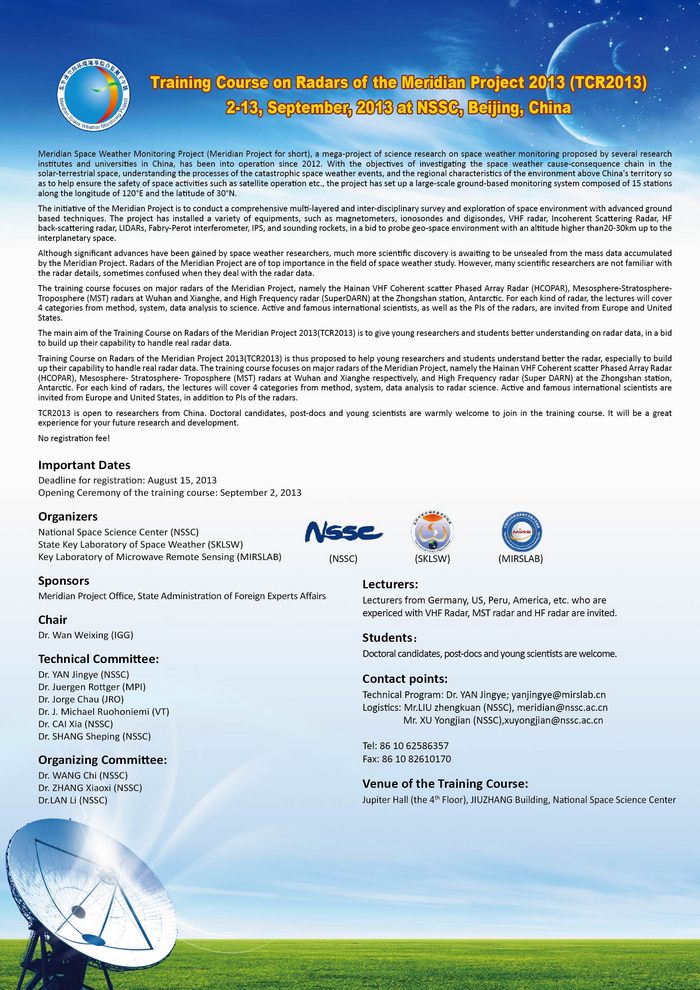Announcement
(2013.9.2-13)Training Course on Radars of the Meridian Project 2013(TCR2013)

Meridian Space Weather Monitoring Project (Meridian Project for short), a mega-project of science research on space weather monitoring proposed by several research institutes and universities in China, has been into operation since 2012. With the objectives of investigating the space weather cause-consequence chain in the solar-terrestrial space, understanding the processes of the catastrophic space weather events, and the regional characteristics of the environment above China's territory so as to help ensure the safety of space activities such as satellite operation etc., the project has set up a large-scale ground-based monitoring system composed of 15 stations along the longitude of 120°E and the latitude of 30°N.
The initiative of the Meridian Project is to conduct a comprehensive multi-layered and inter-disciplinary survey and exploration of space environment with advanced ground based techniques. The project has installed a variety of equipments, such as magnetometers, ionosondes and digisondes, VHF radar, Incoherent Scattering Radar, HF back-scattering radar, LIDARs, Fabry-Perot interferometer, IPS, and sounding rockets, in a bid to probe geo-space environment with an altitude higher than20-30km up to the interplanetary space.
Although significant advances have been gained by space weather researchers, much more scientific discovery is awaiting to be unsealed from the mass data accumulated by the Meridian Project. Radars of the Meridian Project are of top importance in the field of space weather study. However, many scientific researchers are not familiar with the radar details, sometimes confused when they deal with the radar data.
The training course focuses on major radars of the Meridian Project, namely the Hainan VHF COherent scatter Phased Array Radar (HCOPAR), Mesosphere-Stratosphere- Troposphere (MST) radars at Wuhan and Xianghe, and High Frequency radar (SuperDARN) at the Zhongshan station, Antarctic. For each kind of radar, the lectures will cover 4 categories from method, system, data analysis to science. Active and famous international scientists, as well as the PIs of the radars, are invited from Europe and United States.
The main aim of the Training Course on Radars of the Meridian Project 2013(TCR2013) is to give young researchers and students better understanding on radar data, in a bid to build up their capability to handle real radar data.
Training Course on Radars of the Meridian Project 2013(TCR2013) is thus proposed to help young researchers and students understand better the radar, especially to build up their capability to handle real radar data. The training course focuses on major radars of the Meridian Project, namely the Hainan VHF Coherent scatter Phased Array Radar (HCOPAR), Mesosphere- Stratosphere- Troposphere (MST) radars at Wuhan and Xianghe respectively, and High Frequency radar (Super DARN) at the Zhongshan station, Antarctic. For each kind of radars, the lectures will cover 4 categories from method, system, data analysis to radar science. Active and famous international scientists are invited from Europe and United States, in addition to PIs of the radars.
TCR2013 is open to researchers from China. Doctoral candidates, post-docs and young scientists are warmly welcome to join in the training course. It will be a great experience for your future research and development.
No registration fee!
Important Dates
Deadline for registration: August 15, 2013
Opening Ceremony of the training course: September 2, 2013
Organizers
National Space Science Center (NSSC)
State Key Laboratory of Space Weather (SKLSW)
Key Laboratory of Microwave Remote Sensing (MIRSLAB)
Sponsors
Meridian Project Office, State Administration of Foreign Experts Affairs
Chair
Dr.WAN Weixing (IGG)
Technical Committee:
Dr. YAN Jingye (NSSC)
Dr. Juergen Rottger (MPI)
Dr. Jorge Chau (JRO)
Dr. J. Michael Ruohoniemi (VT)
Dr. CAI Xia(NSSC)
Dr. SHANG Sheping (NSSC)
Organizing Committee:
Dr. WANG Chi (NSSC)
Dr. ZHANG Xiaoxi (NSSC)
Dr.LAN Li (NSSC)
Lecturers:
Lectures from Germany, US, Peru, America, etc. who are expericed with VHF Radar, MST radar and HF radar are invited.
Students:
Doctoral candidates, post-docs and young scientists are welcome.
Contact points:
Technical Program: Dr. YAN Jingye; yanjingye@mirslab.cn
Logistics: Mr.LIU zhengkuan, meridian@nssc.ac.cn
Mr. XU Yongjian (NSSC),xuyongjian@nssc.ac.cn
Tel: 86 10 62586357
Fax: 86 10 82610170
Venue of the Training Course:
Jupiter Hall (the 4th Floor), JIUZHANG Building, National Space Science Center


